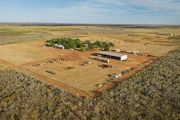
Overseas investors favour Australian housing as they shun US: Qualitas
Qualitas, which funds 10 per cent of all apartments under development – mostly with capital from offshore institutions – says overseas investors will pour more money into Australian housing as they avoid an increasingly unpredictable US market.
The ASX-listed alternative investment manager that on Friday said it had financed 2948 of the 28,200 apartments – in projects of 20 units or more – that started construction in the year to June said it was poised to tap “reallocation” of private credit capital away from the US.

“A dominating theme for us is people saying, ‘we don’t want to invest in the US because we’re worried about Trump economics and tariffs and the geopolitical situation’,” Qualitas managing director Andrew Schwartz told The Australian Financial Review.
“There are lots of reasons why people are turning away from wanting to invest in the US, and there are really three significant destinations of interest – Europe, Japan and Australia – as to where people want to invest.”
That’s good news for the company that increased its funds under management in the year to June by 7 per cent to $9.5 billion – 82 per cent of which came from overseas institutions – but also for a country that needs substantial offshore capital to overcome its chronic housing shortage.
Separately from the increasing negatives of the US market, three positive reasons overseas institutions focused on Australia were its geographic remoteness, its huge need for housing and the ongoing retreat of banks from commercial real estate lending, Schwartz said.
Banks still dominate the market, with a 77 per cent share, while in Europe the figure was 50 per cent and in the US just 32 per cent, he said.
“They see us as a geographically remote country,” Schwartz said. “They see our chronic housing shortage. They see the structural change going on within banks and they want to get a piece of it.
“Even though there’s been what we predict a 30 per cent uptick in residential development over the last 12 months, we believe there’s still a chronic shortage that can only be met by significant institutional capital.”
A pickup in capital from offshore institutions that wanted to place larger sums of money in bigger projects, of 300 apartments or more, in cities such as Melbourne, which in recent years suffered a dearth of such projects, would likely boost Qualitas’ share of the residential funding market, he added.
“We have become a vital part of the supply of debt capital to the property sector for both investment loans and housing,” Schwartz said.
“There haven’t been large build-to-sell projects in the Melbourne CBD in recent times. Our capital is suited to large projects with quality sponsors and our market share of total apartments financed by Qualitas could easily increase should we see a resurgence of that market.”
For the year to June, Qualitas’ total income jumped 30 per cent to $109.4 million from $84 million as financial services income grew and interest costs fell.
Expenses also rose, with employee costs leaping by more than one-third to $43.1 million. But even so, net profit after tax jumped 28 per cent to $33.4 million from $26.2 million a year earlier and diluted earnings per share rose to 11.15¢ from 8.81¢.











